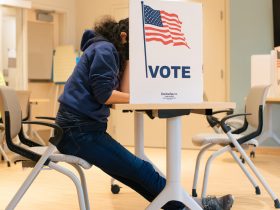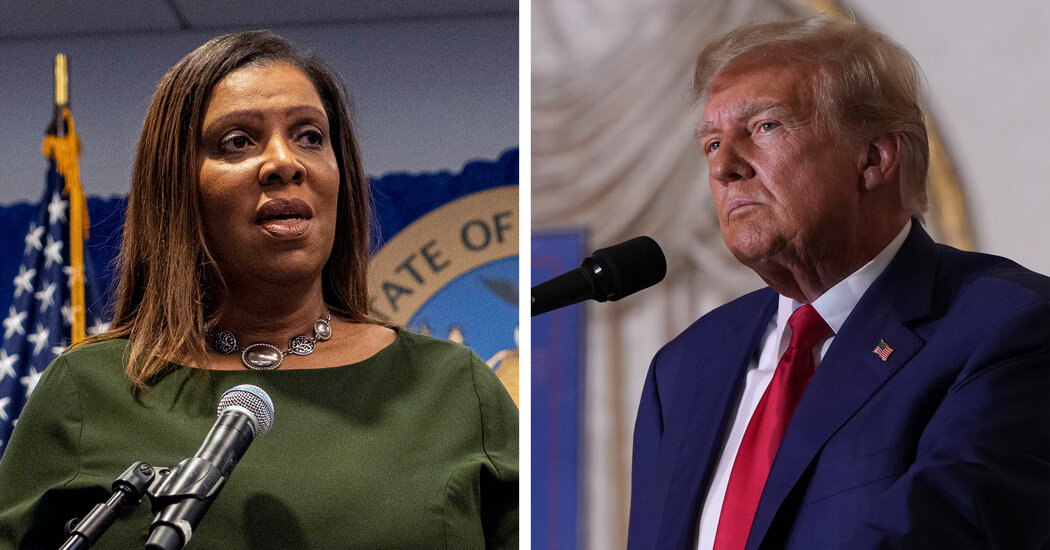Donald J. Trump is set to be questioned under oath on Thursday in a civil fraud lawsuit brought by New York Attorney General Letitia James, the latest in a series of legal predicaments entangling the former president, who also faces a separate 34-count criminal indictment unsealed last week.
Ms. James’s civil case, which was filed in September and is expected to go to trial later this year, accuses Mr. Trump, his family business and three of his children of a “staggering” fraud for overvaluing the former president’s assets by billions of dollars. The lawsuit seeks $250 million that it contends they reaped through those deceptions, made in Mr. Trump’s annual financial statements — and asks a judge to essentially run him out of business in the state if he is found liable at trial.
In preparation for the trial, Ms. James’s office is now questioning Mr. Trump as part of the discovery phase of the case. It will be the second time that lawyers for Ms. James, a Democrat, have questioned Mr. Trump under oath: He also sat for a deposition in the summer of 2022, shortly before the attorney general filed her lawsuit.
During that deposition, Mr. Trump lashed out at Ms. James, accusing her of being motivated by politics and then invoking his Fifth Amendment right against self-incrimination hundreds of times over the course of four hours.
Depositions are held in private, so the specifics of his testimony on Thursday will not be immediately known. But as of Wednesday evening, Mr. Trump was not expected to assert his Fifth Amendment right, people familiar with his thinking said.
Because he was in the White House or on the campaign trail for several years — and no longer running his company — Mr. Trump might try to avoid providing direct answers to Ms. James’s questions, instead giving non-substantive responses. He might say, for example, that he does not recall a particular incident or was not present for it. He could also claim that he delegated the valuation of his assets to employees.
Mr. Trump has consistently denied wrongdoing and accused Ms. James of conducting what he has labeled “a witch hunt.” Two judges have rejected arguments from Mr. Trump that Ms. James’s case is politically motivated.
If Mr. Trump does decide to answer questions, even without providing much detail, his choice may reflect a legal calculation about the difference between civil trials, like the one that would stem from Ms. James’s lawsuit, and criminal trials. While jurors in criminal trials cannot hold a defendant’s silence against him, in civil trials, they are permitted to take into account a refusal to answer questions — and infer that it means that the defendant had something to hide. If Mr. Trump refused to answer questions, it could seriously damage his chance of winning at trial.
But answering questions on Thursday could expose Mr. Trump to additional legal peril. Once he provides answers on a topic, he would essentially forfeit his right to refuse other questions on that same topic. And it can be easier to refuse to answer substantive questions altogether, than to respond to some while dodging others.
The greatest risk to Mr. Trump comes if he goes off script. Although he is no stranger to being deposed, there is a chance he could respond impulsively under intense questioning, as he has done in the past, actively confronting his interviewers. (He once told a lawyer that her questions were “very stupid.”)
Ms. James might use what Mr. Trump says against him at trial and could eventually share his statements with criminal prosecutors who are also investigating him.
Last week, the Manhattan district attorney’s office unsealed the 34-count indictment, which accused him of having illegally covered up a hush-money payment his former fixer, Michael D. Cohen, made to a porn star during the 2016 presidential campaign.
That same office, led by the district attorney, Alvin L. Bragg, has also been investigating the conduct at the heart of Ms. James’s civil case. Early last year, the district attorney’s office was marching toward an indictment of Mr. Trump for fraudulently inflating the value of his assets, but Mr. Bragg developed concerns about proving the case.
Still, Mr. Bragg has said that investigation is continuing.
And he may not be the last prosecutor to indict Mr. Trump. In Georgia, the Fulton County District Attorney, Fani T. Willis, is investigating his attempts to influence the results of the 2020 election in the state. And in Washington, a federally-appointed special counsel is scrutinizing his efforts to overturn the election results, as well as his handling of sensitive documents.
Ms. James’s lawsuit accused Mr. Trump of lying to lenders and insurers about the value of his assets, and asserted that he had violated state criminal laws, and “plausibly” federal laws, too. It detailed the way that Mr. Trump’s annual financial statements inflated the worth of nearly all of his best-known properties — including Trump Tower, 40 Wall Street in Manhattan and Mar-a-Lago in Florida — to secure better terms from the lenders and insurers.
Mr. Trump’s company, the Trump Organization, was also named as a defendant, as were Donald Trump Jr., Eric Trump and Ivanka Trump. In filing the lawsuit, Ms. James sought to oust the Trumps from leading their family business and to prevent the family from acquiring real estate in New York for five years.
And at Ms. James’s request, the judge in the case, Arthur F. Engoron, appointed Barbara S. Jones, a former federal judge, as an independent monitor to oversee the Trump Organization’s use of the annual financial statements.
In January, Justice Engoron denied Mr. Trump’s motion to dismiss the case. He has scheduled a trial for early October.
















Leave a Reply